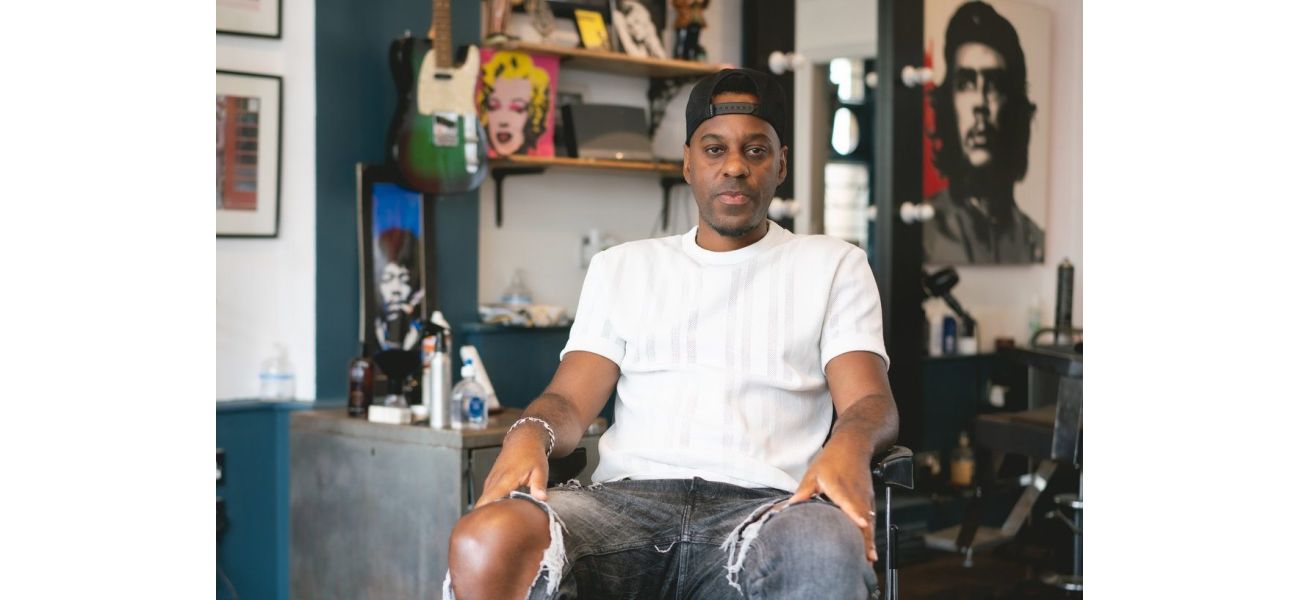I consider myself a 'working dad' and hope to inspire other fathers.
The term "working dads" is not used as commonly as "working mums," but it should be.
December 30th 2024.

Elliott Rae had a passion for promoting equality in the workplace, particularly when it came to working fathers. As he stood in front of a room full of executives and the permanent secretary, he felt a nervous flutter in his stomach. It was October of 2018 and he was in the midst of giving a presentation on advancing racial equality within the department. However, he found himself having to excuse himself mid-presentation, saying that he needed to go pick up his daughter from nursery. It was not a common occurrence for someone to leave a meeting of such importance, but Elliott had no choice as the timing coincided with his daughter's pick-up time. While none of the executives showed any disappointment or frustration at his sudden departure, Elliott couldn't help but feel a twinge of guilt for leaving in the middle of his presentation.
Deep down, Elliott knew he had done everything in his power to avoid this awkward situation. He had informed his personal assistant days before that he needed to leave at 3pm to pick up his daughter, but the message must not have been passed on. This incident made him think about other fathers in similar positions and how they might not have the same privilege or understanding from their employers. It was then that it dawned on him - the phrase "working dads" was not used as commonly as "working moms", but it should be. By acknowledging and supporting the role of fathers in the workplace, men could thrive in their careers while also being able to be present and involved fathers.
When Elliott and his wife found out they were going to be parents in January of 2015, they were overjoyed. However, like many first-time parents, they were naive about the impact a child would have on their lives. The responsibility of being a parent had a profound effect on Elliott's decision making, priorities, and freedom. He became more aware of his surroundings, caring about the environment and even picking up litter on his street. Simple tasks like cooking a meal or going to the barber suddenly seemed like huge undertakings. Before their daughter was born, Elliott and his wife had a conversation about how they would share the responsibilities of childcare equally. They talked about splitting nursery drop-offs and pick-ups, working their careers around it, and both being responsible for bath and bedtime routines. They also discussed balancing the demands of parenthood with date nights and other social activities. This open communication and division of responsibilities was crucial in avoiding confusion and resentment in the future.
However, Elliott acknowledged that not every couple would have the same arrangement when it comes to childcare responsibilities. What was important was having an open conversation about what works for them. For Elliott and his wife, the reality of parenting was challenging from the start as their daughter was born with a serious infection. This meant that they struggled in the early months and Elliott was left with PTSD. It affected his mental health, causing him to feel anxious in work meetings, cry on the train ride home, and struggle with insomnia. Thankfully, he had a supportive and understanding line manager who allowed him to work flexibly, giving him the time and space he needed to take care of his mental health and be there for his family. Working compressed hours, having a later start time, and occasionally working from home were all arrangements that allowed Elliott to share the load of parenting and bond with his daughter. As a result, their relationship has always been special and continues to be to this day.
Elliott Rae is a man on a mission, determined to bring the term "working dads" into popular use. He stood in front of a room full of important people, including the permanent secretary, feeling a mix of nerves and excitement. It was October 2018 and he was about to give a presentation on promoting racial equality within the department. However, he couldn't help but feel anxious about leaving early for the nursery run.
As a middle manager, Elliott knew that leaving a meeting early was not something that was typically done. But with his presentation scheduled right before the time he had to pick up his daughter from nursery, he had no choice. Thankfully, none of the executives expressed any disappointment or frustration, likely due to his position in the company. However, Elliott still felt guilty for leaving.
He had done everything in his power to avoid this situation, even informing his PA days in advance that he needed to leave at 3pm for the nursery run. But somehow, the message didn't get passed along. This experience got Elliott thinking about other working dads in similar situations. What if they didn't have the same privilege and understanding from their employer?
That's when it hit him. The phrase "working dads" is not commonly used in the same way as "working mums", but it should be. By recognizing and supporting working dads, we can help them thrive in their careers while also allowing them to be the caring fathers they want to be. This realization came to Elliott when he and his wife found out they were expecting their first child in January 2015.
Like many expectant parents, they were excited but also naive about how having a child would change their lives. The responsibility of caring for another human being had a significant impact on Elliott's decision-making, priorities, and freedoms. He became much more aware of his surroundings and started caring more about the environment. Simple tasks like cooking a meal or going to the barber suddenly seemed like massive undertakings.
However, before their daughter was born, Elliott and his wife had an important conversation about sharing childcare responsibilities equally. They discussed how they would split drop-offs and pick-ups from nursery, and how they could adjust their careers to make it work. They also made a plan to share the bath and bedtime routines and juggle weekend activities and date nights.
Having these conversations and setting expectations from the start was crucial for their relationship. Studies have shown that unequal division of childcare and household duties can lead to higher divorce rates. Thankfully, Elliott had a supportive and understanding line manager who allowed him to work flexibly. This was especially important as their daughter was born with an infection and their first few months as parents were difficult.
Elliott was left with PTSD and struggled with anxiety, tears, and insomnia. But thanks to his flexible work arrangements, he was able to manage his mental health and be there for his family. Working compressed hours, having later start times, and working from home one day a week allowed him to share the load and be there for important moments with his daughter. This has led to a special and strong relationship between them, even to this day.
Deep down, Elliott knew he had done everything in his power to avoid this awkward situation. He had informed his personal assistant days before that he needed to leave at 3pm to pick up his daughter, but the message must not have been passed on. This incident made him think about other fathers in similar positions and how they might not have the same privilege or understanding from their employers. It was then that it dawned on him - the phrase "working dads" was not used as commonly as "working moms", but it should be. By acknowledging and supporting the role of fathers in the workplace, men could thrive in their careers while also being able to be present and involved fathers.
When Elliott and his wife found out they were going to be parents in January of 2015, they were overjoyed. However, like many first-time parents, they were naive about the impact a child would have on their lives. The responsibility of being a parent had a profound effect on Elliott's decision making, priorities, and freedom. He became more aware of his surroundings, caring about the environment and even picking up litter on his street. Simple tasks like cooking a meal or going to the barber suddenly seemed like huge undertakings. Before their daughter was born, Elliott and his wife had a conversation about how they would share the responsibilities of childcare equally. They talked about splitting nursery drop-offs and pick-ups, working their careers around it, and both being responsible for bath and bedtime routines. They also discussed balancing the demands of parenthood with date nights and other social activities. This open communication and division of responsibilities was crucial in avoiding confusion and resentment in the future.
However, Elliott acknowledged that not every couple would have the same arrangement when it comes to childcare responsibilities. What was important was having an open conversation about what works for them. For Elliott and his wife, the reality of parenting was challenging from the start as their daughter was born with a serious infection. This meant that they struggled in the early months and Elliott was left with PTSD. It affected his mental health, causing him to feel anxious in work meetings, cry on the train ride home, and struggle with insomnia. Thankfully, he had a supportive and understanding line manager who allowed him to work flexibly, giving him the time and space he needed to take care of his mental health and be there for his family. Working compressed hours, having a later start time, and occasionally working from home were all arrangements that allowed Elliott to share the load of parenting and bond with his daughter. As a result, their relationship has always been special and continues to be to this day.
Elliott Rae is a man on a mission, determined to bring the term "working dads" into popular use. He stood in front of a room full of important people, including the permanent secretary, feeling a mix of nerves and excitement. It was October 2018 and he was about to give a presentation on promoting racial equality within the department. However, he couldn't help but feel anxious about leaving early for the nursery run.
As a middle manager, Elliott knew that leaving a meeting early was not something that was typically done. But with his presentation scheduled right before the time he had to pick up his daughter from nursery, he had no choice. Thankfully, none of the executives expressed any disappointment or frustration, likely due to his position in the company. However, Elliott still felt guilty for leaving.
He had done everything in his power to avoid this situation, even informing his PA days in advance that he needed to leave at 3pm for the nursery run. But somehow, the message didn't get passed along. This experience got Elliott thinking about other working dads in similar situations. What if they didn't have the same privilege and understanding from their employer?
That's when it hit him. The phrase "working dads" is not commonly used in the same way as "working mums", but it should be. By recognizing and supporting working dads, we can help them thrive in their careers while also allowing them to be the caring fathers they want to be. This realization came to Elliott when he and his wife found out they were expecting their first child in January 2015.
Like many expectant parents, they were excited but also naive about how having a child would change their lives. The responsibility of caring for another human being had a significant impact on Elliott's decision-making, priorities, and freedoms. He became much more aware of his surroundings and started caring more about the environment. Simple tasks like cooking a meal or going to the barber suddenly seemed like massive undertakings.
However, before their daughter was born, Elliott and his wife had an important conversation about sharing childcare responsibilities equally. They discussed how they would split drop-offs and pick-ups from nursery, and how they could adjust their careers to make it work. They also made a plan to share the bath and bedtime routines and juggle weekend activities and date nights.
Having these conversations and setting expectations from the start was crucial for their relationship. Studies have shown that unequal division of childcare and household duties can lead to higher divorce rates. Thankfully, Elliott had a supportive and understanding line manager who allowed him to work flexibly. This was especially important as their daughter was born with an infection and their first few months as parents were difficult.
Elliott was left with PTSD and struggled with anxiety, tears, and insomnia. But thanks to his flexible work arrangements, he was able to manage his mental health and be there for his family. Working compressed hours, having later start times, and working from home one day a week allowed him to share the load and be there for important moments with his daughter. This has led to a special and strong relationship between them, even to this day.
[This article has been trending online recently and has been generated with AI. Your feed is customized.]
[Generative AI is experimental.]
0
0
Submit Comment





